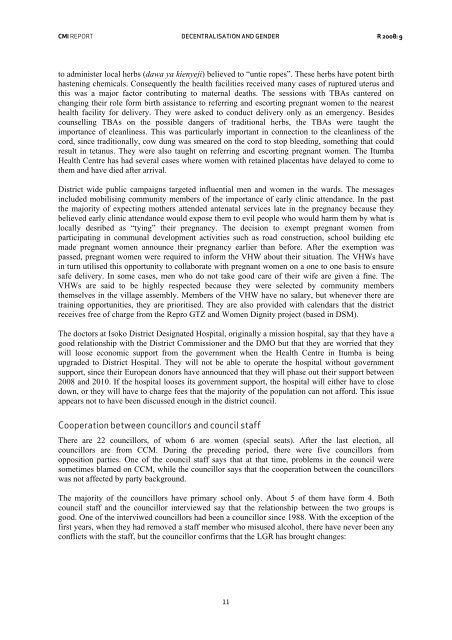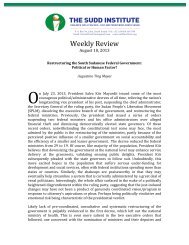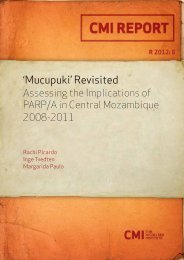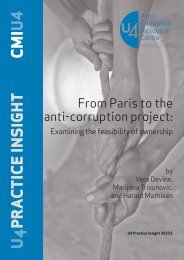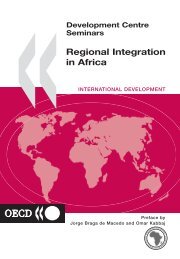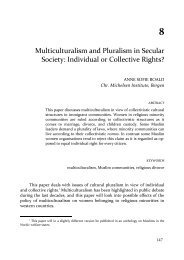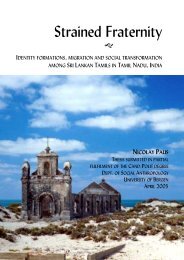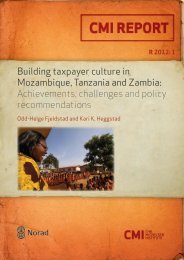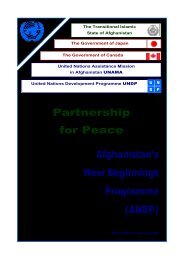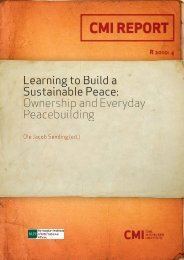Download (pdf) - CMI
Download (pdf) - CMI
Download (pdf) - CMI
You also want an ePaper? Increase the reach of your titles
YUMPU automatically turns print PDFs into web optimized ePapers that Google loves.
<strong>CMI</strong> REPORT DECENTRALISATION AND GENDER R 2008: 9<br />
to administer local herbs (dawa ya kienyeji) believed to “untie ropes”. These herbs have potent birth<br />
hastening chemicals. Consequently the health facilities received many cases of ruptured uterus and<br />
this was a major factor contributing to maternal deaths. The sessions with TBAs cantered on<br />
changing their role form birth assistance to referring and escorting pregnant women to the nearest<br />
health facility for delivery. They were asked to conduct delivery only as an emergency. Besides<br />
counselling TBAs on the possible dangers of traditional herbs, the TBAs were taught the<br />
importance of cleanliness. This was particularly important in connection to the cleanliness of the<br />
cord, since traditionally, cow dung was smeared on the cord to stop bleeding, something that could<br />
result in tetanus. They were also taught on referring and escorting pregnant women. The Itumba<br />
Health Centre has had several cases where women with retained placentas have delayed to come to<br />
them and have died after arrival.<br />
District wide public campaigns targeted influential men and women in the wards. The messages<br />
included mobilising community members of the importance of early clinic attendance. In the past<br />
the majority of expecting mothers attended antenatal services late in the pregnancy because they<br />
believed early clinic attendance would expose them to evil people who would harm them by what is<br />
locally desribed as “tying” their pregnancy. The decision to exempt pregnant women from<br />
participating in communal development activities such as road construction, school building etc<br />
made pregnant women announce their pregnancy earlier than before. After the exemption was<br />
passed, pregnant women were required to inform the VHW about their situation. The VHWs have<br />
in turn utilised this opportunity to collaborate with pregnant women on a one to one basis to ensure<br />
safe delivery. In some cases, men who do not take good care of their wife are given a fine. The<br />
VHWs are said to be highly respected because they were selected by community members<br />
themselves in the village assembly. Members of the VHW have no salary, but whenever there are<br />
training opportunities, they are prioritised. They are also provided with calendars that the district<br />
receives free of charge from the Repro GTZ and Women Dignity project (based in DSM).<br />
The doctors at Isoko District Designated Hospital, originally a mission hospital, say that they have a<br />
good relationship with the District Commissioner and the DMO but that they are worried that they<br />
will loose economic support from the government when the Health Centre in Itumba is being<br />
upgraded to District Hospital. They will not be able to operate the hospital without government<br />
support, since their European donors have announced that they will phase out their support between<br />
2008 and 2010. If the hospital looses its government support, the hospital will either have to close<br />
down, or they will have to charge fees that the majority of the population can not afford. This issue<br />
appears not to have been discussed enough in the district council.<br />
Cooperation between councillors and council staff<br />
There are 22 councillors, of whom 6 are women (special seats). After the last election, all<br />
councillors are from CCM. During the preceding period, there were five councillors from<br />
opposition parties. One of the council staff says that at that time, problems in the council were<br />
sometimes blamed on CCM, while the councillor says that the cooperation between the councillors<br />
was not affected by party background.<br />
The majority of the councillors have primary school only. About 5 of them have form 4. Both<br />
council staff and the councillor interviewed say that the relationship between the two groups is<br />
good. One of the interviwed councillors had been a councillor since 1988. With the exception of the<br />
first years, when they had removed a staff member who misused alcohol, there have never been any<br />
conflicts with the staff, but the councillor confirms that the LGR has brought changes:<br />
11


